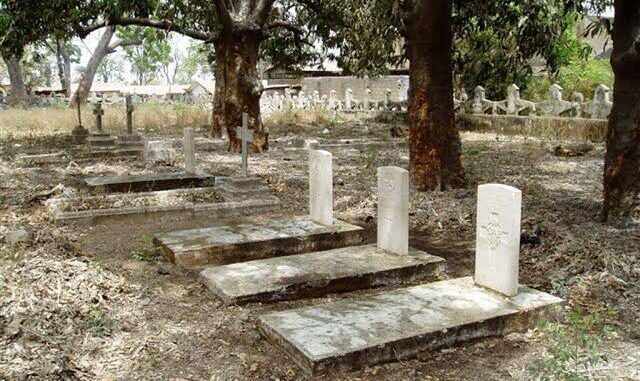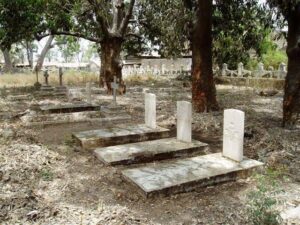

She was only having a wrapper on her and a pair of slippers. Nothing suggested fear on her face as she moved from one grave to another sun-drying her clothes.
After spending about three minutes in the cemetery, Bola moved directly opposite the expansive graveyards and continued with her washing.
Observing the shock on the face of our correspondent who was gazing at her, Bola, a resident of Aremo community in Bodija, Ibadan North East, Ibadan, Oyo State, queried: “Why are you looking at me like that?”
“Are you not afraid of walking in the midst of dead bodies and even spreading clothes on them?” Responding to the poser by our correspondent after requesting for his identity, Bola said, “Graveyards no longer scare me. This is my fifth year living in this Aremo area and I have lost count of the corpses I have seen buried here (pointing to the Cemetery of the Cathedral of St Peter, Aremo, Ibadan, where she had gone to sun-dry her clothes). So, I am not afraid.”
The cemetery, which occupies a large expanse of land, was separated by an untarred road that leads to Aremo Primary Health Centre. This is the only road that leads to the hospital and patients, especially pregnant women who often visit the hospital would have to pass through the graveyards at both left and right sides of the road to access the healthcare centre.
Findings by The Point revealed that indigenous people of the community are already used to the influx of the dead into their abode, and that only new residents and visitors find the graveyards disturbing in a residential area.
Notwithstanding the cluster of dead bodies in the area, commercial activities were in operation even as some houses had been deserted due to their fragile conditions while some others bear “Rooms to Let” inscriptions.
Some of them were of the opinion that seeing dead bodies buried often has taught them that life is transient and one should always prepare for death. They said there are pains and gains of living beside cemeteries.
Bola explained to our correspondent that “many people come and live in this area because house rent is cheaper when compared with other areas. I think the presence of this cemetery is partly responsible for it.
“As some move out after staying for about a year, others put up here because it is either their only option or it is closer to their workplace.”
She said it was traumatizing for her when she newly relocated to the area alongside her parents about five years ago, adding that she got used to waking up to graves after about two years in the area.
According to her, “I do imagine that ghosts would walk into our house and whenever my parents are not at home, we ensure our doors are locked and we don’t go out at night until they return. I have never seen a ghost before but our neighbours argue that ghosts move about at midnight.”
Speaking about how she became neighbours to dead bodies, she said, “We got here, myself and my parents in 2019 and by that time, I was in SS3. We live upstairs and that makes us always wake up to the graveyard and even at night when we are out to receive fresh air, we have no other side to look at except at the direction of the cemetery.
“I was always afraid then and each time my parents and siblings are not within the compound, I don’t come out especially whenever people bring dead bodies to bury there. It was difficult to find sleep and whenever I struggled to sleep, I would have scary dreams. I dared not return home at night. Wherever I went, I would have to return home before night falls. Same thing applied to my siblings,” she added.
On how she conquered her fears, Bola explained that her parents were instrumental to her being at peace with the graves-ridden environment.
“As you can see, I am no longer afraid of seeing people buried or even getting close to their graves. I even walk on graves and use them as places for sun-drying my clothes. This was possible because my father and mother would always take me to the Primary Health Centre that is close to the cemetery and whenever we are returning at night, we trek it together. They would ask me not to be afraid, that no ghost would come out.
“When I started strolling out with my peers in the area, I started having the boldness of even returning home at night alone.
“But, I must confess that seeing people, both young and old, being buried often always teaches me that this life is nothing and that anybody can die anytime whether old, young, rich or poor,” she stated.
Immediately Bola returned to her laundry, her friend and neighbour who was in the vicinity said she suffered psychological and emotional torment seeing graves almost every day.
Mary said the situation was so bad that only a handful of her friends knew her house because of the fear of the cemetery.
“It was not easy for me living near a cemetery. But, once you get used to this area, everything becomes normal. Unlike two years ago, I now walk at night. Before, we dared not open our doors once it was 8pm. We see people being buried here and whenever their family and relatives cry, we just look at them and learn from their pain that one should live well and leave a good legacy,” she said.
It is worthy of note that in the past, cemeteries were sited far away in the bush and people would not dare move close unless they had a corpse to inter. In those days, people trembled anytime they walked past a cemetery, as it was only for the fearless and courageous. Then, anyone who dared to live close would be suspected of having magical powers or an ulterior motive.
Even in orthodox churches, the land reserved as a graveyard used to be located a few metres away from the church and people would rarely live close.
But these days, people now live beside cemeteries, a situation that has been placed down to growing population, scarcity of affordable land and increasing development.
Residential buildings at a Owode Igbona area in Osogbo, capital of Osun State, are competing for space with cemeteries situated in the area.
A resident of the area, who simply identified himself as Funsho, explained that he does hear some strange sounds and movements at night and that such occurrences make his heart beat.
“I am living with a friend here. Everything looks good in the morning and afternoon. But, once the cloud gets dark, this place used to be desolated because my friend had told me that some dead persons would want to stroll to the market square close to the cemetery. Wherever I go, I try to come back home before night and whenever I sleep, I ensure that my Bible is always beside me and I don’t open my window. I am packing out of this area whenever I raise money. House rent is expensive now and I have to save for it,” the tiller said.
Meanwhile, a security guard at Aremo graveyard who did not want his name mentioned, informed The Point that no resident of the area has ever complained that they were taunted by ghost, disclosing that the challenge the area encountered was suspected ritualists sneaking and loitering the cemetery at night wanting to dig out dead bodies.
He said, “I am aware that some residents who are new in this community may be panicking whenever they see these graveyards but once they spend some months here, the fear will leave them. Nobody has ever informed us that ghosts attacked them in this community. What we used to experience are incidents of some unscrupulous persons who attack the cemetery and try to exhume human parts. But, we have fortified our security of this area and we no longer record such crimes.”
Meanwhile, a psychologist, Dr. Adebowale Oreoluwa Olamide, has explained that open communication with children who live close to the cemetery could assist in addressing their fears.
Olamide, a Mental Health Advocate and Founder, Talk to Dr.Ola Counseling Platform, told The Point that, “Living around a cemetery can evoke a mix of psychological responses. Some may find it peaceful, reflecting on the transience of life, while others may feel uneasy or even fearful, especially if they hold strong beliefs about the afterlife. It can also depend on cultural attitudes toward death and burial practices.
“Over time, people may adapt to the presence of the cemetery, with the initial impact lessening as they become accustomed to it.
“For children, the psychological effect of living around a cemetery can vary widely depending on their age, temperament, and exposure to discussions about death. Younger children may be curious or even frightened by the idea, while older children may have a better understanding and be less affected. Parents’ attitudes and explanations about death can significantly influence how children perceive and cope with living near a cemetery. Open communication and reassurance can help address any concerns or fears they may have.”

Leave a Reply